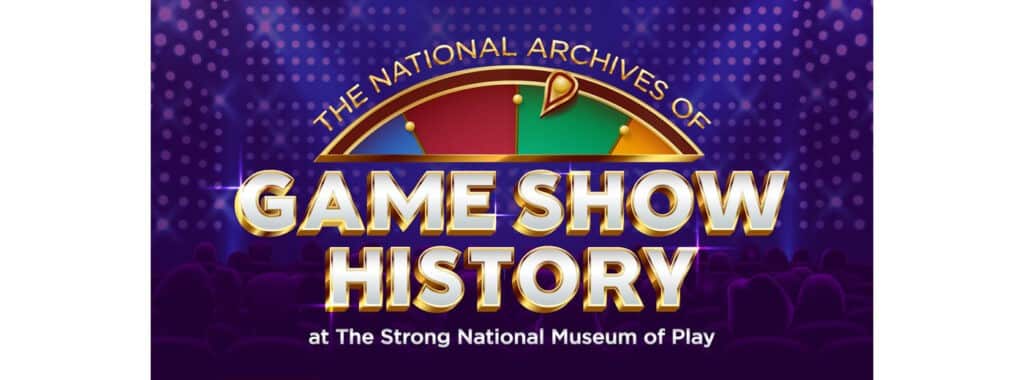The National Archives of Game Show History
The National Archives of Game Show History at The Strong preserves the history of game shows—from the earliest panel shows and quiz scandals, to the games and puzzles of the 1970s, to the big money network series and the classic games now in primetime.

Oral Histories
Co-founded by veteran television producers Howard Blumenthal (Where in the World is Carmen Sandiego?) and Bob Boden (Funny You Should Ask), The National Archives of Game Show History focuses on acquiring the records and materials of the many professional producers, performers, directors, designers, writers, and staff members who have been involved in all facets of game show development, production, marketing, and distribution. The materials they provide—scripts, set designs, props, technical plans, marketing materials, creative plans, production plans, and more—form the heart of the archives. Read the Variety magazine article.

From the Blog:
National Archives of Game Show History
-
Apple II Powered Game Show
By Adam Nedeff, researcher for the National Archives of Game Show History After its founding on April 1, 1976, Apple Computer Company had one of the fastest rises ever for an upstart company. Their first computer was named, simply, Apple I, but in June 1977, the company changed the world with the Apple II. With…
-
Pee-Wee Herman…the Game Show Star?
By Adam Nedeff, researcher for the National Archives of Game Show History The two-part documentary Pee-Wee as Himself, now available for streaming on HBO Max, chronicles actor Paul Reubens’ unexpected rise to fame as the character Pee-Wee Herman. As the documentary explains, game shows had a small role in the rise of Reubens and his…
-
“Luckiest” Man in Game Shows
By Adam Nedeff, researcher for the National Archives of Game Show History A new movie coming out on April 4, The Luckiest Man in America, chronicles one of the most famous (some would say infamous) moments in game show history. Paul Walter Hauser stars as Michael Larson, an ice cream truck driver who made history…
-
Bill Cullen: The Man Who Hosted 29 Game Shows
By Adam Nedeff, researcher for the National Archives of Game Show History The most prolific name in the history of game shows was a man who once admitted to TV Guide, “I’m certainly not the man who appeals to women ages 18-35.” Bill Cullen was right about that. He appealed to everybody. For 40 years,…
-
Hilarious Game Show Answers
By Adam Nedeff, researcher for the National Archives of Game Show History While going through some filing cabinets filled with memos and paperwork from the CBS game shows of the 1980s, we found a marvelous document titled, “I Heard It on the Pyramid-Vine.” The authors, Jerry Martz and Tom Buchanan, were CBS audio technicians. Both…
-
Survey Says: How Family Feud Gets Its Answers
By Adam Nedeff, researcher for the National Archives of Game Show History “We surveyed 100 people. The top six answers are on the board…” You probably easily guessed those iconic lines come from Family Feud. But have you ever wondered who those 100 people are? Writing material and building each episode is plenty of work…
-
How *That* Microphone Became a Game Show Staple
By Adam Nedeff, researcher for the National Archives of Game Show History It seems strange that game shows have a signature microphone. If you watch a comedy sketch spoofing game shows, then the host character is usually holding a long, pencil-thin microphone. Watch reruns of classic game shows, or even the game shows of today,…
-
Game Shows Have Scripts?
By Adam Nedeff, researcher for the National Archives of Game Show History The National Archives of Game Show History has been fortunate to have many eager contributors donate their prized possessions to be preserved. Among the many treasures that have been donated: set pieces, handheld props, question cards, photographs and slides, tickets, and scripts. “Wait…
-
Reviving the Family Feud Sign
Among the treasures in The Strong Museum’s National Archives of Game Show History is the original flip-dot display used on Family Feud when it made its debut in 1976. So what’s the story behind the sign? It all starts with Mark Goodson and Bill Todman, the undisputed kings of TV game shows. Their success started…
-
Birth of the Modern Game Show
By Bob Boden, co-founder of the National Archives of Game Show History On September 4, 1998, ITV network in the United Kingdom premiered a one-hour primetime game show called Who Wants to Be a Millionaire. It featured one contestant, sitting across from host Chris Tarrant, answering up to 15 multiple choice general knowledge questions of…
How to Donate
If you are interested in adding to The National Archives of Game Show History:
- Make a list of the potential donations and send it to collections@museumofplay.org. (Call 585-410-6340 if you have questions.)
- The Strong museum’s curators, librarians, and archivists will consider your offer.
- The appropriate staff member will contact you regarding your offer and, if it’s right for the archives, work with you to determine the best way for it to physically reach the museum.
- When the item(s) arrives at the museum, the donation is processed (steps that may include cataloging, conservation attention, and photography).
- The donation is presented to the museum’s Acquisitions Team for final approval.
- The collections manager sends the donor a Deed of Gift via email or U.S. Mail as preferred.
- The donor completes and signs the Deed of Gift, keeps a copy, and returns a copy to The Strong.
Frequently Asked Questions
What kinds of materials are you looking to collect?
Program development documents; program proposals; pilot and production scripts (some with notes from production personnel); materials related to hosts and players; scenic plans, renderings, construction drawings; materials related to music and sound effects; show rundowns; shell scripts; director’s notes; network notes; edit notes; publicity materials; and associated physical materials which may include costume designs, props, graphics, and more. These materials may be originals, copies, scans, facsimiles, depending upon what is reasonably available. All such materials shall be provided on an as-is basis.
What about intellectual property rights?
The museum is aware that donors of papers, documents and other materials may not hold copyright or intellectual property rights to the content. The Strong provides those donors with clear and specific ways to designate the appropriate limitations involved with intellectual property.
How does the museum decide whether to accept a donation?
The museum considers each potential acquisition carefully. The appropriate curator, librarian, or archivist evaluates each item or collection to make sure it supports the goals of The National Archives of Game Show History and does not duplicate items already in the museum’s holdings. When items or groups of items fit those criteria, the staff member responsible for the initial review presents a written justification for acquisition to The Strong’s Acquisitions Team. If that group agrees at its monthly meeting, a Deed of Gift form is prepared for the donor.
What is a Deed of Gift?
Once The Strong museum’s Acquisitions Team has officially accepted an item or a collection, the donor receives a Deed of Gift via email or U.S. Mail. A Deed of Gift is a formal document that transfers legal ownership of the donated item(s) to The Strong. Provisions within the document allow donors to choose how they want their donation acknowledged, to define or assign intellectual property rights, and to specify preferences for research access.
What are the financial implications of a donation?
The Internal Revenue Service has determined that The Strong qualifies as a 501(c)(3) organization. In keeping with professional standards and accreditation requirements of the American Alliance of Museums, The Strong does not appraise items offered for donation. Donors are encouraged to seek the advice of counsel before claiming deductions for the purpose of computing income and heritance taxes under state and federal laws.
Must donated materials be in mint condition?
Items or collections offered to the museum should be complete (not missing significant parts) and in stable condition, but they do not have to be mint-in-box or look the way they did when new. It is not necessary to clean objects prior to offering them to The Strong. Curatorial and conservation staff members examine each artifact to assure that its condition will allow it to be preserved for future exhibition, research, and educational needs.
Should I organize my collection before offering it to The Strong?
It’s not necessary to organize a collection prior to offering it to The Strong. Staff from the museum’s Collections Team will organize the materials after they arrive.
Should I clean or repair my objects before offering them to The Strong?
It’s not necessary to do cleaning or repair work prior to offering it to The Strong. Conservation staff will evaluate what steps are necessary once items are accepted by the museum.
Will my donations be displayed?
In its early years, The National Archives of Game Show History will operate as a research facility, not as a display for general guests at The Strong museum. In the future, we may develop a public exhibit. However, donations are shared with a worldwide audience by way of the museum’s online collections, its library catalog, and its archives catalog. These databases serve as entry points for researchers, scholars, students, the media, and the public to locate pertinent material for their interests or projects.
Can I get to my materials again after I donate them?
Yes, you are welcome to make an appointment in advance with the museum’s staff so that they can provide you access to items not on display.
Additional Information
To learn more about The National Archives of Game Show History, explore the history of games shows, and read full biographies of co-founders Howard Blumenthal and Bob Boden, please see the press kit.
For press inquiries, contact:
Shane Rhinewald
Senior Director of Public Relations
srhinewald@museumofplay.org
585-410-6365





